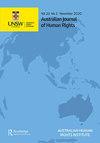认识上的不公正和补救:BHR真的能“中心化”权利持有人吗?
Q1 Arts and Humanities
引用次数: 0
摘要
联合国工商业与人权指导原则(UNGPs)鼓励利用非司法申诉机制(NJGMs)作为诉讼补救企业侵犯人权行为的补充途径。然而,通过njgm进行补救仍然具有挑战性。尽管关于补救和问责的"将权利持有人置于中心"的说法越来越多,但对企业在工商业与人权领域的影响的批评仍然存在。本文认为,认知不公正的概念语言对BHR有很大的帮助。通过认识不公正的镜头,通过njgm关注补救,它确定了更深层次检查的选择切入点。认知不公正的概念可以帮助识别讨论空间中话语权力的行使和边缘化的实践,这可以解释BHR空间中参与者数量增加与他们生活经验缺乏变化之间的差距。它可以帮助指出补救障碍在何处以及如何重现,并为权利持有人提供了额外的语言,以阐明在这些环境中所遭受的具体类型的伤害。如果BHR的真正目标是将权利持有人置于中心,那么BHR社区就有道德义务在个人和结构层面上质疑和解决认知上的不公正。本文章由计算机程序翻译,如有差异,请以英文原文为准。
Epistemic injustice and remedy: Can BHR ever really ‘centre’ rights holders?
ABSTRACT The UN Guiding Principles on Business and Human Rights (UNGPs) encourage the use of non-judicial grievance mechanisms (NJGMs) as complementary avenues to litigation for remedying corporate human rights abuses. However, remedy through NJGMs remains challenging. Despite a growing narrative around ‘putting rights holders at the centre’ of remedy and accountability, critiques of the corporate influence in the field of business and human rights (BHR) remain. This paper argues that the conceptual language of epistemic injustice has much to offer BHR. Focusing on remedy through NJGMs through an epistemic injustice lens, it identifies select entry points for deeper examination. The concept of epistemic injustice can help identify exercises of discursive power and practices of marginalisation in deliberative spaces, which may explain gaps between increased numbers of participants in BHR spaces and the lack of change in their lived experiences. It can help point to where and how barriers to remedy are being reproduced, and it offers additional language for rights holders to articulate specific types of harms experienced in these settings. If BHR truly aims to put rights holders at the centre, the BHR community has an ethical obligation to interrogate and address epistemic injustice both at the individual and structural levels.
求助全文
通过发布文献求助,成功后即可免费获取论文全文。
去求助
来源期刊

Australian Journal of Human Rights
Arts and Humanities-History
CiteScore
1.30
自引率
0.00%
发文量
43
期刊介绍:
The Australian Journal of Human Rights (AJHR) is Australia’s first peer reviewed journal devoted exclusively to human rights development in Australia, the Asia-Pacific region and internationally. The journal aims to raise awareness of human rights issues in Australia and the Asia-Pacific region by providing a forum for scholarship and discussion. The AJHR examines legal aspects of human rights, along with associated philosophical, historical, economic and political considerations, across a range of issues, including aboriginal ownership of land, racial discrimination and vilification, human rights in the criminal justice system, children’s rights, homelessness, immigration, asylum and detention, corporate accountability, disability standards and free speech.
 求助内容:
求助内容: 应助结果提醒方式:
应助结果提醒方式:


